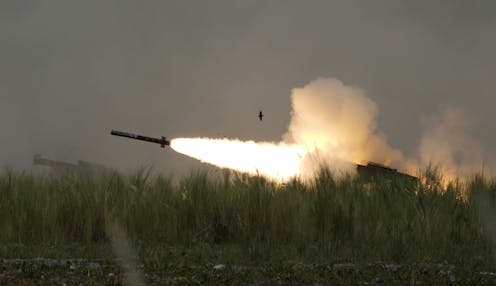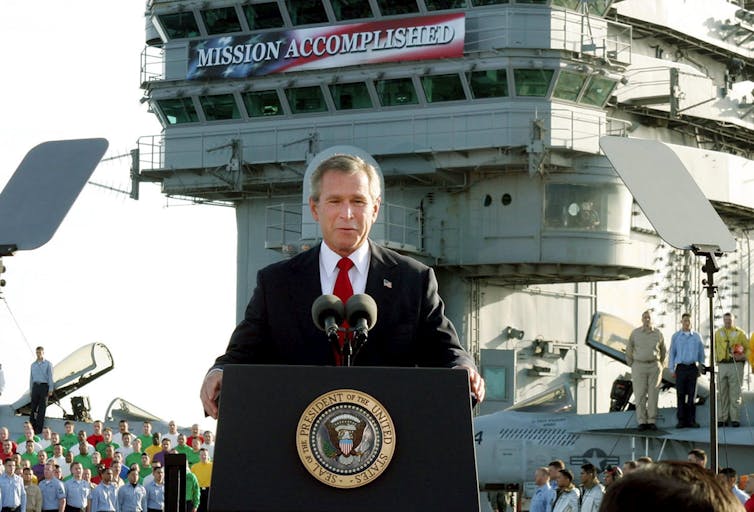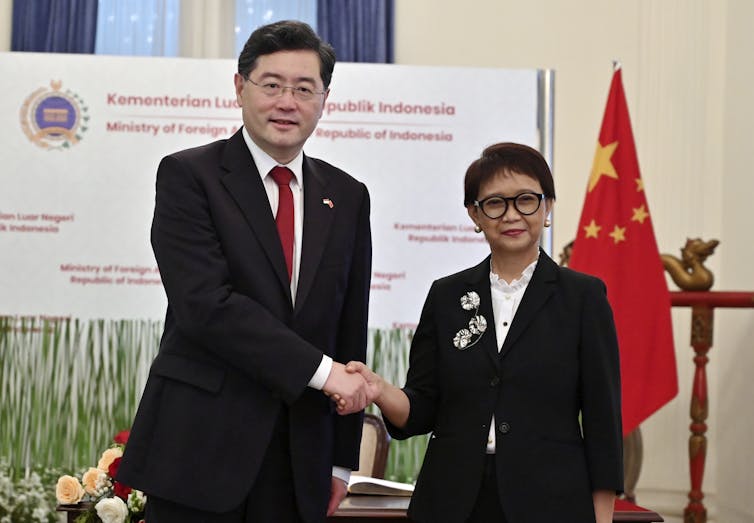
In its pursuit of permanent global domination, the United States has pushed the world towards unnecessary conflict, especially via its two-decade “war on terror.”
American allies could dissuade the U.S. from its tendency to take a dangerous and divisive path, but their own weaknesses and commitment to the status quo are making them complicit.
According to the Watson Institute at Brown University, the conflicts connected to the war on terror have killed about 4.6 million people since 2001. About a million have died in direct violence but the others — disproportionately women and children — have been casualties of political, economic and social instability in numerous countries that have been the target of the war on terror.
That conflict defines 21st century world politics, far more than the war in Ukraine. It was driven by former U.S. president George W. Bush’s messianic impulses and neoconservative ideologues who aspired to reshape the Middle East in the American image using military force.
U.S. Congress voted overwhelmingly to support the Bush wars. The war in Iraq, an unprovoked and illegal invasion of a sovereign state, demonstrated the danger of unchecked American power and hubris.

Ignoring international law
The Watson Institute report explains why states targeted by the U.S. have reasons to fear American violence and interference. International law doesn’t necessarily constrain the U.S. — it’s often willing to abuse its power and privileges for political, economic and strategic advantage.
This reality partly explains Russia’s reaction to the expansion of NATO and its invasion of Ukraine.
Read more: 3 NATO gambles that have played a big role in the horrors of war in Ukraine
Concerns about U.S. overreach also influences China’s policies in the South China Sea, as the Chinese worry about being economically strangled by an American naval blockade.
China has done little to the U.S. except to grow to an economic size and a level of technological innovation that challenges American global domination.
In response, the U.S. is attacking China’s economic and technological development. It is creating economic and military alliances against China.
American leaders apparently believe a country four times the population of the U.S. must remain forever subordinate to American power.
It’s true that China has threatened Taiwan and behaved aggressively in the South China Sea. Even so, compared to the U.S., Chinese foreign policy has been restrained.
Read more: Nancy Pelosi’s visit to Taiwan causes an ongoing Chinese tantrum in the Taiwan Strait
Much of the world has refused to back western sanctions against Russia because, in part, the West’s hypocrisy around issues of global violence and interference has undermined western credibility.
Instead, many countries are pursuing “non-alignment” — choosing to avoid getting caught in the middle of any future battles between the U.S. and China.

Rallying allies
Nonetheless, the U.S. has rallied its established allies against China. Canada has become an American vassal, meaning it’s essentially dominated by the U.S. Japan has increased its military spending. The European Union has taken a harder line on economic and technological engagement with China.
There are some indications that France and Germany recognize their interests may not align with those of the U.S., but they have not confronted American officials on these issues.
Why do American allies refuse to discuss U.S. global violence, despite its horrific consequences and the fact that it clearly affects the world view of America’s rivals and the non-western world?
Why are they so tolerant of American militarism — often even complicit in it — while condemning the militarism of others?
It’s likely because American allies have benefited enormously from the U.S.-backed status quo, even if they’ve had to deal with the fallout of western militarism — particularly in Europe, where the influx of refugees has coarsened regional politics.
They’re accustomed to following the U.S. Many have willingly accepted, parroted and even amplified American propaganda.
Politics of fear
This attitude is understandable for narrowly self-interested, amoral states, but it’s short-sighted.
American allies are wilfully ignoring the extent of the profound social, political and economic divisions within the U.S. and their implications for reliable and coherent American leadership and policy.
Read more: Canada should be preparing for the end of American democracy
Domestic political instability in the U.S. may eventually motivate even more aggressive American foreign policy. The U.S. has never shied away from the politics of fear and the exaggeration of threat. Its escalating demonization and provocation of China is especially dangerous.
China is a country of 1.4 billion people with an ancient culture and a massive economy. It cannot be locked in a box, as the U.S. is trying to do, without consequences.
China gains a great deal from the current international system. It has reasons to support much of the existing economic order.

Accommodating China will require adjustments on the part of status quo states. That means abandoning the world view that so many western democracies have embraced as part of western triumphalism since the end of the Cold War.
Is preserving the privileged global position of the U.S. really so important to the rest of the world? Is maintaining such an imbalanced world order possible or, given its results, truly desirable?
U.S. allies need to learn the lessons of the war on terror and the 4.6 million people it’s killed. A leader needs followers. American allies could make their support of the U.S. conditional on a pledge to ease up on militarism and focus on greater global co-operation.
Shaun Narine does not work for, consult, own shares in or receive funding from any company or organization that would benefit from this article, and has disclosed no relevant affiliations beyond their academic appointment.
This article was originally published on The Conversation. Read the original article.







